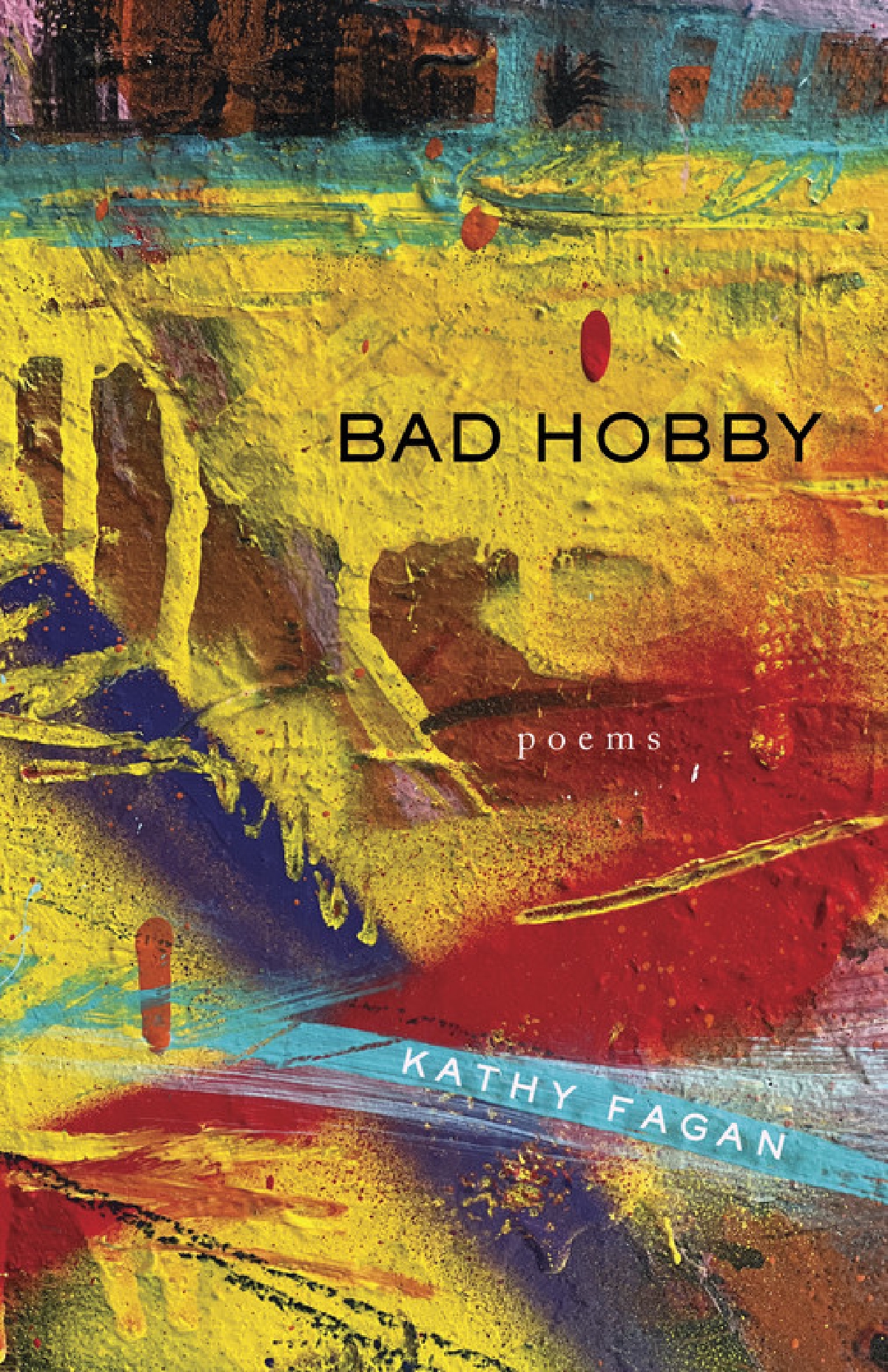
On Meaningful Mistakes: A Review of Bad Hobby by Kathy Fagan
Kathy Fagan’s newest poetry collection Bad Hobby bursts with energy while reflecting on matters of grief, mortality, and memory. The poet positions herself between the stories of her ailing father, reflections on childlessness, and a playful interrogation of the limitations and lineage of language, such as in the poem “Fountain”:
My dad photographs sunrise and the moon in its phases: Calls each of them a sunset…
…I said like as in, like we kill time. I mean metaphor, as when time kills us back.
The collection dances around turns of phrase and demonstrates a humorous, masterful use of language. This relationship is especially apparent in the title poem, “Bad Hobby,” where the speaker’s father misremembers the phrase “bad habit” as “bad hobby” in a striking linguistic metamorphosis. In the same poem, Fagan notes, “Hobby derives from a Latin/ Diminutive for horse, from which// We get hobbyhorse, as in one man’s/ Sport, another man’s war.” These poems demonstrate how mistakes in language, as in life, can prove all the more meaningful through their lyric possibilities.
The voice of the collection explores a range of high and low registers, a speaker of experience allowing herself the heartfelt vulnerability associated with childhood. One devastating example of this can be found in the poem “At the Champion Avenue Low-Income Senior & Child Care Services Center” where the poet explains, “Dad never liked me to talk:/ Lower your voice…You’ll catch/ more flies with honey than vinegar, as if someday/ I’d need the flies. I stopped talking, started writing/ instead.” The deceptively straightforward phrases demonstrate a deft mastery of the line, delivering piercing narrative with elegant enjambment. This poem and many others portray the complexities of familial relationships, giving these works a fresh, almost coming-of-age quality. “I’m worried, and ashamed/ to be. ‘Sensitive,’ it was called by the family,/ in the hushed tones of a fatal diagnosis,” the poet writes in “Keelson.” The poem ends painfully: “I stopped speaking…would sooner/ go hungry than ask to be understood.”
The intertwined family narrative and wordplay are further emphasized by the collection’s bestiary quality, sparkling with swans, lions, horses, and cats, to underline the intersections with class and gender. “Woman is man’s most successful/ domesticated animal,” the poet warns in “Predator Satiation.” “I’m no exception, childless, or child-free.” Through these moves, the poet takes on shoes like a horse in “Empire” and her father’s picked teeth juxtapose with the teeth of a lion in “Animal Prudence.” The speaker’s own feelings about these comparisons are complicated by both tenderness and pain, as the poem “Aftermath” articulates: “Benign neglect is how my brother says we were raised. Free-range/ kids, we say gamely about ourselves.” This animal language can be beautiful, such as in “Keelson”—“Like a cracked cup of milk, the swan leaks/ white on the wet dock”—or even hilarious, such as in “The Supreme Farewell of Handkerchiefs”:
…flying like the birds I cannot stop Writing into poems no matter how many People say, Enough with the effing birds! Actually only poets say that. And we’re lying because there’s never enough for us.
Bad Hobby feels delightfully self-aware and vulnerable in its attention to the act of writing poetry with moments of Fagan’s writing origins against the backdrop of her working-class father. The anecdotes and testimonies of the poems take on even greater urgency as you realize the speaker’s father is losing his memory. This is, at its core, what the book is about: a collection on lineage and memory, the poet recording what her father, blurred by dementia and loss, cannot.
The first poem in the collection “Dedication” describes “A sign that says: You are responsible/ For your own deads./ Plural.” The “deads” and dedications echo through the collection, reverberations of loss that remind me of Fagan’s last book, Sycamore. But unlike Sycamore, Bad Hobby offers a different kind of mourning, one that opens to the beauty around us in a new way, even if time will “kill us back” one day. This openness is part of what made this collection so insightful, and just the book I needed this year.
I so admire Bad Hobby’s ability to balance the playful and poignant, allowing for both tears and laughter as it captures the devastatingly exquisite inconsistencies that make us human. Cumulatively, this is a fresh and vivid collection that offers both humor and heart—you will want to return to Bad Hobby in all the seasons life offers.
Bad Hobby is available now from Milkweed Editions.